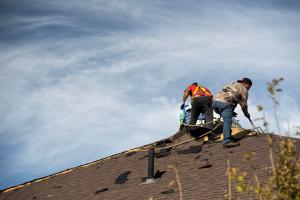When to Replace vs. Repair a Commercial Roof: Key Factors for Business Property Owners
Jules Albert III, owner of Jaymar Construction LLC in Slidell, Louisiana, emphasizes the importance of timing and accurate assessment. “Roofing decisions should be made based on objective analysis, not guesswork or short-term savings,” said Albert. “Repairing a failing system can sometimes create more risk than replacing it.”
Determining whether to repair or replace a commercial roof depends on five core considerations: age of the system, severity of damage, frequency of past repairs, structural integrity, and current energy performance. Each factor provides insight into the most cost-effective and structurally sound course of action.
1. Roof Age
Most commercial roofing systems have an expected service life, depending on material type and installation quality. Single-ply membranes like TPO and EPDM may last 20–25 years, while built-up or modified bitumen roofs can range from 15–30 years. As the roof nears the end of its service life, performance begins to degrade even if no visible damage is present.
When a roof approaches its maximum lifespan and issues begin to surface, replacement typically provides more value than continued patching. Investing in a new system also brings the benefit of updated insulation and compliance with evolving building codes.
2. Damage Scope
Isolated damage—such as punctures from fallen branches, minor membrane tears, or flashing separation—can often be repaired effectively. However, widespread membrane degradation, water infiltration across large areas, or damage from hurricanes and hailstorms usually indicates the need for replacement.
A thorough inspection should document the extent of moisture penetration, membrane integrity, and substrate condition. Infrared thermography or core sampling may reveal hidden damage not visible from the surface. If a large percentage of the roof is compromised, partial repair may provide only temporary relief while masking deeper problems.
3. Frequency of Past Repairs
When a commercial roof requires repeated service within short intervals, replacement becomes the more sustainable option. A pattern of leaks, delamination, or blistering may indicate that the roofing system has reached a tipping point. Repeated repairs can disrupt operations, increase liability exposure, and end up costing more than replacement in cumulative expenses.
Property managers should maintain a record of roof service history, including repair locations, material costs, and downtime. A cost-benefit analysis comparing total repair spend versus replacement investment helps clarify the financial implications over time.
4. Structural Integrity
Roof structure and decking play a crucial role in determining repair versus replacement. Saturated insulation, deteriorated decking, or corrosion in steel components can weaken the system to the point that surface repair becomes ineffective. Water-damaged substrates must be removed and replaced to prevent mold, sagging, and eventual failure.
Structural assessments following storm events or after decades of use may reveal hidden concerns that necessitate a full tear-off. Restoring the roof’s foundational support ensures safety, especially in buildings located in coastal or high-wind zones like Southeast Louisiana.
5. Energy Performance and Code Compliance
Roofing systems also contribute to a building’s energy performance. Older systems with degraded insulation or poor reflectivity may increase heating and cooling costs. Modern membranes, cool-roof coatings, and tapered insulation improve efficiency while reducing thermal load.
Local building codes, particularly in hurricane-prone areas, continue to evolve. In some cases, repair work may trigger code upgrades—such as increased fastening patterns, uplift resistance, or energy code compliance. A full replacement allows integration of updated materials and adherence to current regulations in one coordinated project.
Making the Decision
The decision to replace or repair a commercial roof involves balancing immediate needs with long-term outcomes. In some scenarios, targeted repairs extend the life of the roof and preserve capital. In others, replacement offers better risk mitigation, operational reliability, and future-proofing.
A comprehensive inspection conducted by a licensed commercial contractor is essential. This evaluation should include drainage analysis, membrane testing, flashing condition, insulation status, and signs of trapped moisture. Photos, documentation, and a scope-of-work proposal should accompany any recommendation to ensure transparency.
In Louisiana’s Gulf Coast region—where seasonal storms, intense humidity, and fluctuating temperatures are common—the risks associated with ignoring early warning signs can escalate quickly. Timely replacement can prevent damage to inventory, tenant disruptions, insurance complications, and costly emergency service calls.
Jules Albert III of Jaymar Construction LLC notes that commercial roof replacement may also offer tax advantages under current federal depreciation rules. Under Section 179 and bonus depreciation guidelines, certain roofing investments may qualify for accelerated write-offs, improving the financial case for a proactive replacement strategy.
Conclusion
Commercial roof systems require informed decision-making and proactive management. When signs of wear begin to emerge, evaluating age, damage, repair history, structure, and energy performance can clarify whether replacement or repair provides the best path forward.
In markets like Slidell and across the Gulf South, these roofing decisions influence not only building performance but also business continuity. Choosing the right path protects long-term value and prevents avoidable disruption.
Morgan Thomas
Rhino Digital, LLC
+1 504-875-5036
email us here
Visit us on social media:
Facebook
Legal Disclaimer:
EIN Presswire provides this news content "as is" without warranty of any kind. We do not accept any responsibility or liability for the accuracy, content, images, videos, licenses, completeness, legality, or reliability of the information contained in this article. If you have any complaints or copyright issues related to this article, kindly contact the author above.
Graphene Battery Market to Witness Comprehensive Growth by 2027 | Cabot Corporation, Cambridge Nanosystems
Biodegradable Plastics Market Enters New Growth Phase – Here’s What the Data Says
Global Viral Clearance Market: Trends, Segmentation, and Future Prospects
Więcej ważnych informacji
 Jedynka Newserii
Jedynka Newserii

 Jedynka Newserii
Jedynka Newserii

Konsument

Tylko 35 proc. Celów Zrównoważonego Rozwoju ONZ możliwe do osiągnięcia przed 2030 r. Potrzebna ściślejsza współpraca międzynarodowa
Jak wynika z raportu ONZ, choć w ciągu ostatniej dekady dzięki dążeniu do realizacji przyjętych celów udało się poprawić życie milionów ludzi na całym świecie, to jednak tempo zmian pozostaje zbyt wolne, by dało się je osiągnąć do 2030 roku. Postęp hamują przede wszystkim eskalacja konfliktów, zmiana klimatu, rosnące nierówności i niewystarczające finansowanie. Jak wynika ze sprawozdania Parlamentu Europejskiego, problemem jest także brak ścisłej współpracy międzynarodowej i sceptyczne podejście niektórych państw ONZ.
Przemysł spożywczy
UNICEF: Wszystkie dzieci poniżej piątego roku życia w Gazie cierpią z powodu niedożywienia. Sytuacja jest katastrofalna

Ataki Izraela na Strefę Gazy i jej izolacja doprowadziły do całkowitego załamania podstawowych usług i ograniczenia możliwości dostaw i dystrybucji pomocy humanitarnej – wskazuje UNICEF. W efekcie setki tysięcy Palestyńczyków są w sytuacji ciągłego zagrożenia życia i cierpią z powodu niedożywienia i głodu. Ta klęska dotyczy praktycznie wszystkich dzieci poniżej piątego roku życia. Konflikty są jednym z głównych przyczyn braku bezpieczeństwa żywnościowego, głodu i niedożywienia na świecie. Szczególnie dotyczy to Afryki i Azji Zachodniej.
Prawo
Branża ciepłownictwa czeka na unijną i krajową strategię transformacji. Liczy na większe fundusze i korzystne regulacje

Komisja Europejska zapowiedziała rozpoczęcie w I kwartale 2026 roku prac nad strategią dla ciepłownictwa i chłodnictwa. Nad tym strategicznym dokumentem w zakresie ciepłownictwa pracuje także polski rząd. Branża podkreśla, że obie te strategie będą miały kluczowe znaczenie dla trwającej transformacji w ciepłownictwie, czyli przyszłości ogromnych inwestycji, które czekają sektor do 2050 roku. Jednocześnie apeluje o większe wsparcie tego procesu ze środków publicznych.
Partner serwisu
Szkolenia

Akademia Newserii
Akademia Newserii to projekt, w ramach którego najlepsi polscy dziennikarze biznesowi, giełdowi oraz lifestylowi, a także szkoleniowcy z wieloletnim doświadczeniem dzielą się swoją wiedzą nt. pracy z mediami.



![Nestlé w Polsce podsumowuje wpływ na krajową gospodarkę. Firma wygenerowała 0,6 proc. polskiego PKB [DEPESZA]](https://www.newseria.pl/files/1097841585/fabryka-nesquik_1,w_85,r_png,_small.png)






.gif)

 |
| |
| |
|